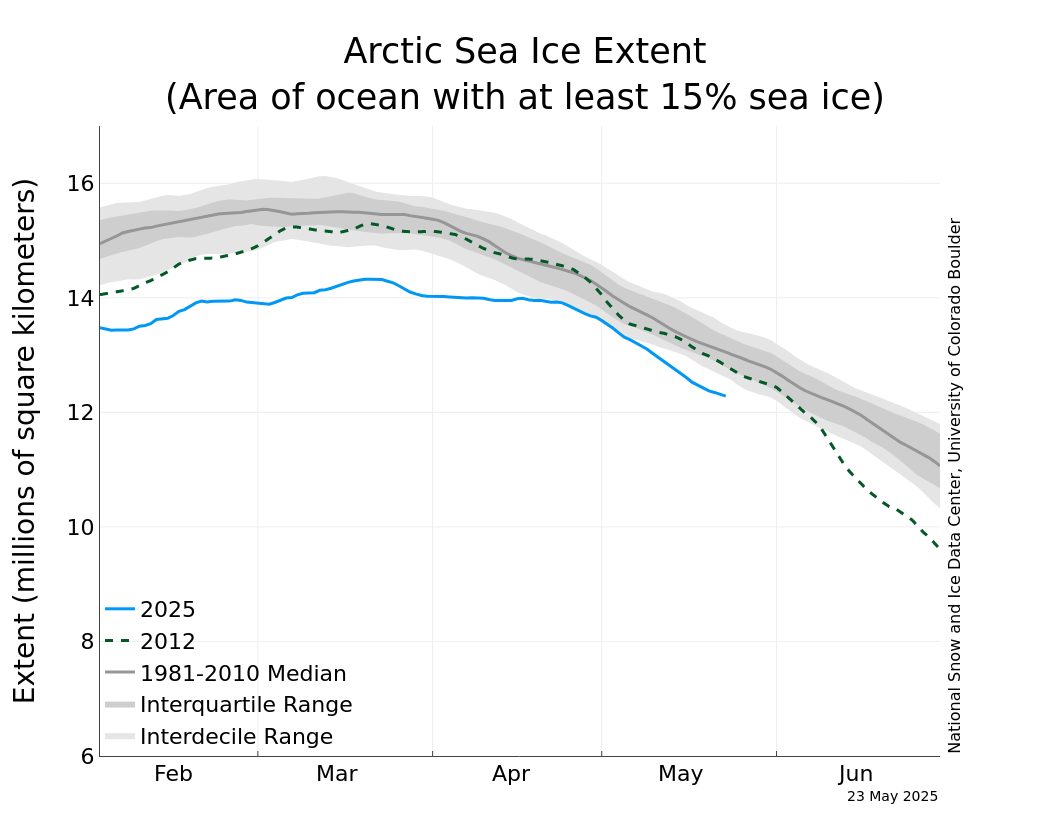RollingThunder
Gold Member
- Mar 22, 2010
- 4,818
- 525
- 155
While the denier cultists irrelevantly argue over their very ignorant and demented cultic delusions and fraudulent myths that have nothing to do with the actual climate science that they can't even begin to understand......
.....in the real world...human caused, CO2-driven global warming is continually making a mockery out of their bamboozled denial of reality....
Canada’s Melting Ice Caps Are a Big Driver of Rising Sea Levels
The Queen Elizabeth Islands’ glaciers – forming the third biggest contributor to sea-level rise after Antarctica and Greenland – are melting at a dramatically increasing rate. Journal author Romain Millan explains why it started happening in 2005.
NewsDeeply
BY Maura Forrest
PUBLISHED ON: Mar. 9, 2017
Canada's northernmost reaches are the Queen Elizabeth Islands, a mass of 13 large islands and hundreds of smaller ones that fan out into the Arctic Ocean just west of Greenland.
There are eight major ice caps and ice fields in the Queen Elizabeth Islands, which account for 25 percent of Arctic land ice, not including Greenland. Many of the glaciers flow directly into marine basins, including the Arctic Ocean, Baffin Bay and Nares Strait.
Before 2000, these glaciers and ice caps were mostly stable. Though they were shrinking slightly, the changes were relatively small from year to year.
But new research published in the journal Environmental Research Letters shows that in 2005 there was a dramatic difference as Arctic temperatures climbed.
ArcticDeeply recently spoke with lead author Romain Millan, a PhD candidate at the University of California, Irvine, who says the Queen Elizabeth Islands are now a major contributor to sea-level rise.
Millan explained how the glaciers of the Queen Elizabeth Islands are changing, how they’re contributing to global sea-level rise and what the future may hold for Canada’s Arctic ice caps.

Romain Millan sets up weather monitoring equipment on Zachariae glacier in northeast Greenland. (Anders Anker Bjørk)
ArcticDeeply: What is happening to the glaciers on the Queen Elizabeth Islands?
Romain Millan: What you have to understand is that there are two main processes that are driving ice loss. You have surface melt and you have discharge of icebergs into the oceanfront n. Before 2005, these two processes were about equal, so the mass losses were equally shared between these two processes. But after 2005, there was a drastic increase in the surface melt due to warmer air temperatures.
Before 2005, the surface melt was at an average of three gigatonnes per year, but after 2005, it increased to 30 gigatonnes of ice per year – so it was multiplied by 10. If we look at the curve of the mass losses, there is an obvious change in 2005. It increased very suddenly.
AD: Did the weather suddenly get much warmer in 2005?
Romain Millan: There was an increase of about 0.5 degrees Celsius (0.9degrees Fahrenheit) between 2005 and present. Warmer temperatures melt ice at the surface of the glaciers. Some might be absorbed on land, but most of the runoff goes into the ocean.
For the period we studied, which is the last 25 years, these glaciers contributed to 1mm (0.04in) of sea-level rise. So if all the glaciers in this region were to melt completely, it would contribute to 8mm (3.4in) of sea-level rise.”
AD: How did you measure this – the ice discharge and the surface melt?
Millan: For the icebergs calving in the ocean, what we did is we gathered ice velocity estimates from satellite data during the last 25 years. After, we combined those data with ice thickness measurements from NASA. When you combine the velocity with the ice thickness measurements, you can infer the ice discharge in the ocean.
And for the surface melt, we used the Regional Atmospheric Climate Model that is developed by European colleagues. Once you have the ice discharge, you combine it with the Regional Atmospheric Climate Model (surface melt estimates) and you have a measure of the total mass losses.
AD: 1mm (0.04in) of sea level rise over 25 years doesn’t sound like all that much. Why should people be concerned about this?
Millan: If the climate continues to warm up as it was projected by the Intergovernmental Panel on Climate Change (IPCC) report, the contribution to sea-level rise is going to continue to increase significantly.
After Greenland and Antarctica, the Queen Elizabeth Islands are the main contributor to sea-level rise. (But) the numbers for Greenland and Antarctica are much larger. If Antarctica were to melt completely, it would contribute to a 70m (230ft) sea-level rise.
AD: To what extent are we locked into this surface melt? Can we change the path these glaciers are taking?
Millan: Carbon dioxide has a very long lifetime in the atmosphere. Even if we stop emissions completely, there will still be CO2 in the atmosphere for years so temperatures will continue to increase. So I have to say I’m not sure if we can do anything to counteract the melt of these glaciers now.
But this study is more of a warning signal about what’s happening to the climate on Earth.
This interview has been edited for clarity and brevity.
---- To stop this you need to pay more in taxes. Now get out your check book and start sending more $$$$ to Washington. Chop Chop.
And the deranged denier cult dimwits, like ol' blockhead, are still stupid enough and gullible enough to believe their fossil fuel industry puppetmasters who tell them that global warming is strictly a political issue...and not the well confirmed scientific fact that it is.


